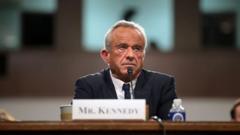Chris Wright, an oil and gas mogul known for advocating fossil fuels, has been nominated by Donald Trump to serve as Secretary of Energy. His Senate confirmation hearings spark debate over climate change policies and energy production strategies. As an evangelical voice for fossil fuels, Wright's nomination raises questions about the future of the U.S. energy landscape.
Trump Chooses Fossil Fuel Advocate Chris Wright as Energy Secretary

Trump Chooses Fossil Fuel Advocate Chris Wright as Energy Secretary
Chris Wright, founder of Liberty Energy, advocates for fossil fuels to combat global poverty amidst Senate hearings.
On January 15, 2025, Chris Wright, the founder and chief executive officer of Liberty Energy, emerged as the pick for the Energy Secretary position during an informal gathering of oil and gas executives at Trump’s Mar-a-Lago resort. Prior to the elections, Mr. Trump asked Wright, who had not previously met him, if he wanted to assume the role of Energy Secretary, a proposition that appeared humorous at the time. However, shortly after the election, Mr. Trump made the decision to appoint Wright to lead the Department of Energy, a move that aligns with his administration's plans to bolster fossil fuel production.
This week, Wright is set to face the Senate Energy and Natural Resources Committee in the first of three confirmation hearings for Trump’s selections leading crucial agencies responsible for expanding coal, oil, and gas usage. A staunch advocate for fossil fuels, Wright has made a compelling moral argument that energy resources are essential for the world's poorest populations to access modern life resources—a viewpoint he has consistently presented in speeches and podcasts, albeit sometimes misrepresenting scientific facts, according to critics.
Democratic senators have expressed divided opinions about Wright during the confirmation proceedings. Senator John Hickenlooper from Colorado acknowledged Wright's intelligence but raised concerns regarding his stance on climate change. In contrast, Senator Sheldon Whitehouse condemned Trump's selection as indicative of corrupt political incentives favoring big energy donors. He highlighted that the Mar-a-Lago meeting witnessed Trump requesting oil executives to donate substantially to his campaign, potentially compromising public resources.
Conversely, Republican Senator Mike Lee emphasized the hearings as a moment to critique the Biden administration's energy policies, asserting the necessity to bolster domestic energy production to tackle the current high energy costs affecting Americans.
If confirmed, Wright would preside over the approval process for liquefied natural gas export terminals, a move positioned to counter the Biden administration's more restrictive policies. Wright boasts a commendable academic background with a degree from MIT and has engaged in research on solar energy. He founded Pinnacle Technologies, which played a significant role in the shale gas industry's evolution.
A driven entrepreneur, Wright started Liberty Energy in 2011, overseeing numerous projects in geothermal energy and nuclear initiatives. He holds a substantial stake in Liberty Energy, valued over $55 million. Following his nomination, he has indicated plans to divest from his company, a requirement for his prospective role as Energy Secretary. However, his confirmation has faced delays from Democrats due to a lack of transparency concerning his financial disclosures, a situation that Senate officials are working to resolve ahead of the hearings.
This week, Wright is set to face the Senate Energy and Natural Resources Committee in the first of three confirmation hearings for Trump’s selections leading crucial agencies responsible for expanding coal, oil, and gas usage. A staunch advocate for fossil fuels, Wright has made a compelling moral argument that energy resources are essential for the world's poorest populations to access modern life resources—a viewpoint he has consistently presented in speeches and podcasts, albeit sometimes misrepresenting scientific facts, according to critics.
Democratic senators have expressed divided opinions about Wright during the confirmation proceedings. Senator John Hickenlooper from Colorado acknowledged Wright's intelligence but raised concerns regarding his stance on climate change. In contrast, Senator Sheldon Whitehouse condemned Trump's selection as indicative of corrupt political incentives favoring big energy donors. He highlighted that the Mar-a-Lago meeting witnessed Trump requesting oil executives to donate substantially to his campaign, potentially compromising public resources.
Conversely, Republican Senator Mike Lee emphasized the hearings as a moment to critique the Biden administration's energy policies, asserting the necessity to bolster domestic energy production to tackle the current high energy costs affecting Americans.
If confirmed, Wright would preside over the approval process for liquefied natural gas export terminals, a move positioned to counter the Biden administration's more restrictive policies. Wright boasts a commendable academic background with a degree from MIT and has engaged in research on solar energy. He founded Pinnacle Technologies, which played a significant role in the shale gas industry's evolution.
A driven entrepreneur, Wright started Liberty Energy in 2011, overseeing numerous projects in geothermal energy and nuclear initiatives. He holds a substantial stake in Liberty Energy, valued over $55 million. Following his nomination, he has indicated plans to divest from his company, a requirement for his prospective role as Energy Secretary. However, his confirmation has faced delays from Democrats due to a lack of transparency concerning his financial disclosures, a situation that Senate officials are working to resolve ahead of the hearings.



















